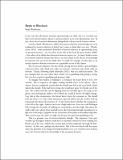Files in this item
Reply to Blackson
Item metadata
| dc.contributor.author | Weatherson, Brian James | |
| dc.date.accessioned | 2016-07-12T15:30:03Z | |
| dc.date.available | 2016-07-12T15:30:03Z | |
| dc.date.issued | 2016 | |
| dc.identifier | 244241593 | |
| dc.identifier | 01713948-2af8-4a88-8f72-ae5d219c605a | |
| dc.identifier | 85049138247 | |
| dc.identifier.citation | Weatherson , B J 2016 , ' Reply to Blackson ' , Journal of Philosophical Research , vol. 41 , pp. 73-75 . https://doi.org/10.5840/jpr201663072 | en |
| dc.identifier.issn | 2153-7984 | |
| dc.identifier.uri | https://hdl.handle.net/10023/9120 | |
| dc.description.abstract | Thomas Blackson argues that interest-relative epistemologies cannot explain the irrationality of certain choices when the agent has three possible options. I argue that his examples only refute a subclass of interest-relative theories. In particular, they are good objections to theories that say that what an agent knows depends on the stakes involved in the gambles that she faces. But they are not good objections to theories that say that what an agent knows depends on the odds involved in the gambles that she faces. Indeed, the latter class of theories does a better job than interest-invariant epistemologies of explaining the phenomena he describes. | |
| dc.format.extent | 37626 | |
| dc.language.iso | eng | |
| dc.relation.ispartof | Journal of Philosophical Research | en |
| dc.rights | Copyright 2016 Philosophy Documentation Center. This work is made available online in accordance with the publisher’s policies. This is the author created, accepted version manuscript following peer review and may differ slightly from the final published version. The final published version of this work is available at https://dx.doi.org/10.5840/jpr201663072 | en |
| dc.subject | B Philosophy (General) | en |
| dc.subject.lcc | B1 | en |
| dc.title | Reply to Blackson | en |
| dc.type | Journal article | en |
| dc.contributor.institution | University of St Andrews.School of Philosophical, Anthropological and Film Studies | en |
| dc.contributor.institution | University of St Andrews.Philosophy | en |
| dc.identifier.doi | 10.5840/jpr201663072 | |
| dc.description.status | Peer reviewed | en |
This item appears in the following Collection(s)
Items in the St Andrews Research Repository are protected by copyright, with all rights reserved, unless otherwise indicated.

